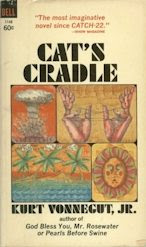 The Book of the Week is my recently acquired first edition of The Handmaid's Tale by Margaret Atwood, cover art by Gail Geltner. This is the true first edition, published in Canada in 1985 by McClelland & Stewart, which predates the more common 1986 first American edition by Houghton Mifflin. The Handmaid's Tale is a classic of science fiction, set in a future in which the sharply declining birth rate has prompted the government to treat fertile women as chattel and compel them to bear children to men of the state's choosing. The Handmaid's Tale was shortlisted for the Booker Prize for fiction, and was a nominee for the Nebula Award and winner of the Arthur C. Clarke Award for best science fiction novel of the year (probably to the author's chagrin as explained below).
The Book of the Week is my recently acquired first edition of The Handmaid's Tale by Margaret Atwood, cover art by Gail Geltner. This is the true first edition, published in Canada in 1985 by McClelland & Stewart, which predates the more common 1986 first American edition by Houghton Mifflin. The Handmaid's Tale is a classic of science fiction, set in a future in which the sharply declining birth rate has prompted the government to treat fertile women as chattel and compel them to bear children to men of the state's choosing. The Handmaid's Tale was shortlisted for the Booker Prize for fiction, and was a nominee for the Nebula Award and winner of the Arthur C. Clarke Award for best science fiction novel of the year (probably to the author's chagrin as explained below).Margaret Atwood is one of an ever growing number of acclaimed mainstream authors who occasionally write science fiction. This is hardly surprising, since for an author who has something to say, SF offers a broader range of possible metaphors to make ones point. This year's Pulitzer Prize went to a science fiction novel, The Road by Cormac McCarthy, and just this week the Nobel Prize for literature was awarded to Doris Lessing, another mainstream writer who often writes SF, including next week's BOTW.
Strangely, many of these authors insist that their works are not science fiction no matter how obvious it is to the rest of us. In denying that her recent novel Oryx and Crake is science fiction, notwithstanding its premise that civilization has been wiped out by a man-made biological catastrophe and all but one of the survivors are genetically engineered post-humans, Margaret Atwood insultingly explained that science fiction is about "talking squids in outer space."
Jeanette Winterson recently took this game to new levels of absurdity, claiming that her new novel The Stone Gods, a love story between a human and a robot traveling to another planet in the far future, is not science fiction. She went so far as to have the characters in the novel insist that science fiction is beneath them, prompting the following wonderful rejoinder from Ursula K. LeGuin. I would say I wish I had written this, but it is even better coming from Ursula LeGuin, an author so outstanding she single-handedly disproves any suggestion that the quality of writing in the science fiction genre is below mainstream standards:
It's odd to find characters in a science-fiction novel repeatedly announcing that they hate science fiction. I can only suppose that Jeanette Winterson is trying to keep her credits as a "literary" writer even as she openly commits genre. Surely she's noticed that everybody is writing science fiction now? Formerly deep-dyed realists are producing novels so full of the tropes and fixtures and plotlines of science fiction that only the snarling tricephalic dogs who guard the Canon of Literature can tell the difference. I certainly can't. Why bother? I am bothered, though, by the curious ingratitude of authors who exploit a common fund of imagery while pretending to have nothing to do with the fellow-authors who created it and left it open to all who want to use it. A little return generosity would hardly come amiss.

